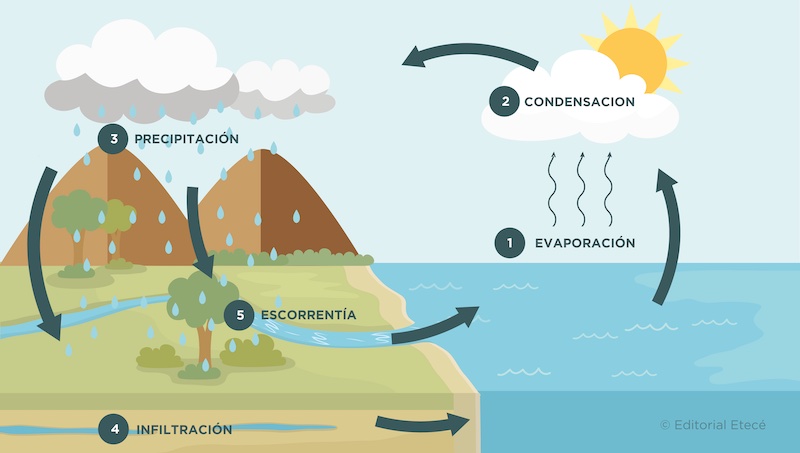We explain the importance of the water cycle for life on the planet. Why it is essential for animals, plants and humans.

What is the importance of the water cycle?
The water cycle It is fundamental for life, the development of biodiversity, the distribution of water and the climate dynamics of the planet. All living things need water to live.
The water cycle distributes water on the planet. Through processes such as evaporation, condensation, precipitation, infiltration and runoff, the water cycle influences the distribution of different climate patterns on Earth.
The water cycle is also essential for the development of biodiversity on Earth. Rivers, lakes and underground bodies of water, in addition to being fundamental for the water cycle, host a wide variety of life forms, and are the source of drinking water supply for the population.
Throughout the cycle, water can be found in a liquid state (in rivers, streams, lakes, lagoons, aquifers, oceans and seas); in solid state (in glaciers and polar caps); and in the gaseous state (in water vapor).
See also: Water cycle
For living beings and ecosystems
Water provided through the water cycle is essential for the survival of all living things. Humans, animals and plants depend on this continuous supply of water for hydration, nutrition and other physiological processes necessary for life.
The water cycle is the main process that redistributes water on Earth. Through evaporation from the Earth's surface and subsequent condensation as clouds, water is transported through the atmosphere and then returned to Earth as precipitation. This redistribution is essential for maintain the supply of fresh water necessary for life of living beings on the planet.
Freshwater bodies such as rivers, lakes, wetlands and aquifers depend on the water cycle to sustain the life they support. The cycle guarantees the recharge of underground aquifers and the renewal of aquatic habitats, which is essential for the maintenance of biodiversity of those environments.
Water provides habitat and sustenance for numerous species such as fish, amphibians, aquatic invertebrates and microorganisms. The quality of water and its availability are determinants for the health of these ecosystems and the biodiversity they house. For this reason, aquatic ecosystems are also essential for fishing and food provision, as well as for recreation and tourism.
The water cycle is related to other biogeochemical cycles vital for living beings, such as the carbon cycle and the nitrogen cycle. These cycles facilitate the distribution of essential nutrients, which influences the different forms of life in aquatic and terrestrial ecosystems.
For humans and economic activities
The water cycle is the essential process that guarantees the supply of fresh water that humans use for drinking, cooking, washing and economic activities. Furthermore, through evaporation, cloud formation and precipitation, the water is purified naturally, which contributes to its quality as a water resource for human consumption.
Agriculture is highly dependent on the water cycle. Rain is the main source of water for crops, and irrigation systems also rely on water supply from surface and underground sources.
Other economic activities such as fishing, livestock, mining, industry and tourism They also depend on the availability of water provided by the water cycle.
In addition, the water cycle contributes to maintaining the flow of water necessary for energy generation, especially hydroelectric and thermoelectric.
The water cycle influences navigation and maritime transport. Rivers, lakes and oceans are important transportation routes and its access and use depend on the availability and regulation of water levels provided by the hydrological cycle.
For the weather
Large bodies of water, especially oceans, play a crucial role in regulating the global climate. They absorb heat from the sun and distribute it through ocean currents to all the seas and oceans on the planet. The oceans also act as a reservoir for carbon dioxide, which helps regulate the concentration of greenhouse gases in the atmosphere.
The water cycle is also an essential process for climate regulation. It involves the evaporation of water and its subsequent condensation in clouds, which can produce precipitation in the form of rain or snow. This perpetual cycle redistributes heat and humidity in the atmosphere, influencing the formation of different climates on the Earth's surface.
Humidity and precipitation are determining factors to distribute the availability of fresh water on Earth. Additionally, water has a high thermal capacity, meaning it can absorb and retain large amounts of heat.
This regulation of Ocean temperatures help moderate temperatures in coastal areas which tend to be, compared to areas far from the sea, less warm in summer and less cold in winter.
Water vapor, for its part, is a natural greenhouse gas, which means that it contributes to maintaining the temperature of the atmosphere at levels suitable for the development of life on Earth.
The water cycle also has a direct impact on climate regulation and the temperature of the Earth. Evaporation of water from the Earth's surface absorbs heat and this heat is then released when water vapor condenses into clouds and falls as precipitation. This thermal regulation influences regional climate patterns and contributes to maintaining temperatures suitable for life on Earth.
- Importance of water
- Runoff
- Transformation of the environment
- Ecological balance
References
- National Geographic (2023) This is how climate change affects the planet's water. https://www.nationalgeographic.com.es/
- Quino Favero, J. (2022) The water cycle and the resilience of ecosystems. University of Lima. https://www.ulima.edu.pe/
- Rodríguez, L (2014) The importance of the economic and social value of water. Aquae Foundation. https://www.fundacionaquae.org/
- Roldán, L (2020) Why is water important for living beings? Green Ecology. https://www.ecologiaverde.com/





